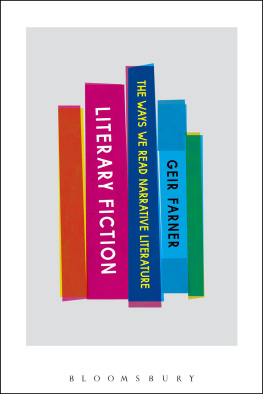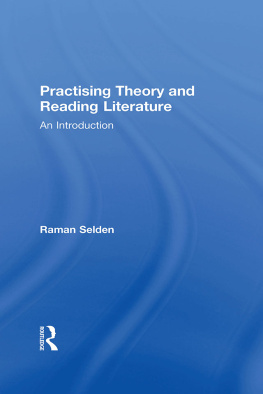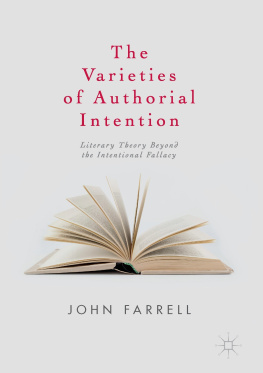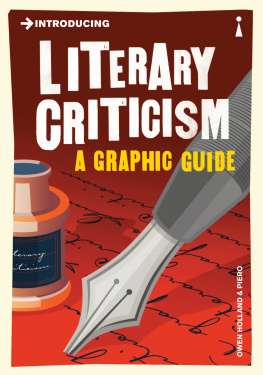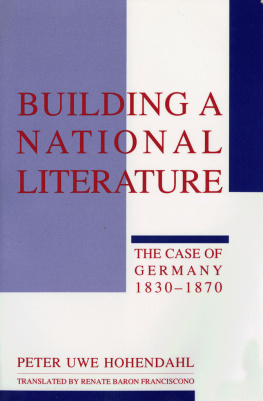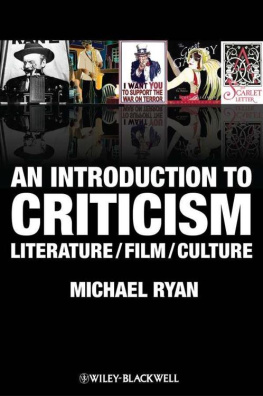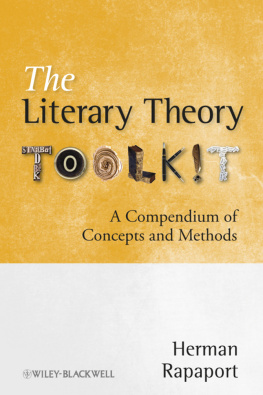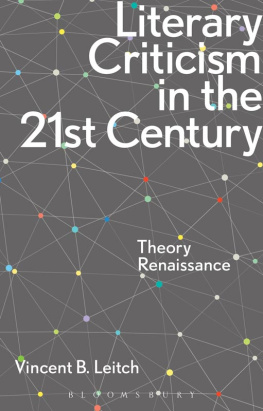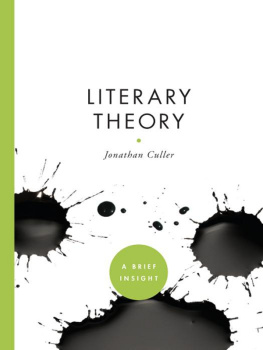Literary Fiction
Literary Fiction
The Ways We Read Narrative Literature
Geir Farner

Bloomsbury Academic
An imprint of Bloomsbury Publishing Inc
| 1385 Broadway | 50 Bedford Square |
| New York | London |
| NY 10018 | WC1B 3DP |
| USA | UK |
www.bloomsbury.com
Bloomsbury is a registered trade mark of Bloomsbury Publishing Plc
First published 2014
Geir Farner, 2014
All rights reserved. No part of this publication may be reproduced or transmitted in any form or by any means, electronic or mechanical, including photocopying, recording, or any information storage or retrieval system, without prior permission in writing from the publishers.
No responsibility for loss caused to any individual or organization acting on or refraining from action as a result of the material in this publication can be accepted by Bloomsbury or the author.
Library of Congress Cataloging-in-Publication Data
A catalog reference for this book is available from the Library of Congress.
ePub ISBN: 978-1-6235-6426-1
Typeset by Deanta Global Publishing Services, Chennai, India
Contents
In his Literary Theory: A Very Short Introduction , after a systematic discussion of the main issues of modern literary theory, Jonathan Culler concludes ( 1997, 11920):
Theory... does not give rise to harmonious solutions. It doesnt, for instance, teach us, once and for all, what meaning is: how much the factors of intention, text, reader, and context each contribute to a sum that is meaning. Theory doesnt tell us whether poetry is a transcendent vocation or rhetorical trick or how much of each. Repeatedly I have found myself ending a chapter by invoking a tension between factors or perspectives or lines of argument and concluding that you have to pursue each, shifting between alternatives that cannot be avoided but that give rise to no synthesis.
Theory, on this view, offers not a set of solutions but the prospect of further engagement. Theory is endless an unbounded corpus of challenging and fascinating writings but not only writings: it is also an ongoing project of thinking (120). According to this conception of literary theory, the nature and function of literature will always remain an open question, and it is up to scholars to take their pick among the dizzying variety of more or less incongruous theories that compete for their sympathies. Culler implies that literature, by its very nature, resists theoretical analysis and understanding, but the cause of this resistance remains unclear. It may be that literature is an unstable concept whose nature and function are continually changing, invalidating any attempt to describe them, because every new description is rendered obsolete by the next innovation. Alternatively, the notion of literature may be stable enough, but our insight into how literature works is still too defective to permit a fruitful description of it. This book is meant as an argument for the latter alternative.
Admittedly, the means of literary expression have always been developing, but, nevertheless, the nature of literary fiction remains unchanged as long as its main structure concerns the presentation of fictional events. Instead of resigning ourselves to the belief that the nature of literature is too volatile or too paradoxical for rational understanding, I think it is fruitful to study the fictional work more closely to see if earlier research may have neglected something that might complete and to some degree reconcile existing theories.
Literary theorists have so thoroughly described the lower-level structures of the literary work (like events, characters, time, characterization, focalization and voices, speech representation and stylistic devices) that there seems to be little room left for improvement. However, the structuralist movement to which the substantial part of this progress is due has tended to exclude the cognitive aspects of literary communication, which are indispensable for any understanding of how literature functions. Limited by its solely linguistic perspective, classical structuralism regards the cognitive aspects of the work as irrelevant because they bear on its meaning, which is considered too subjective to be of scholarly interest. These constraints are typical of the work of 1990. Instead of a general investigation of what fiction communicates and how it communicates it, literary theory at this stage tends to get lost in details of a lower order.
This structuralist resistance has not completely precluded cognition from being discussed in modern literary theory. On the contrary, there seems to be a growing interest in mimesis and cognition, even among modern narratologists (Herman and Vervaeck 2005, Phelan and Rabinowitz 2005, 2010). However, a more advanced description of the basic elements of fictional communication based on the distinction between signifier , signified and referent has yet to surface, and thus, literary theory has yet to satisfactorily explain fictions cognitive influence on the reader.
This is due to multiple factors. Phenomenology, for instance, has tried to understand the literary work as a purely aesthetic phenomenon, leaving little room to consider its cognitive functions. A typical example of this is Wellek and Warrens 1989, 320), but these approaches overlook the ways in which meaning is conveyed structurally. Modern narratology takes an intermediate position, focusing on both meaning and structure, but its focus has shifted from fiction to narrative in general, thus neglecting the special complications related to fictional communication. All in all, literary theory has yet to explain how the fictional text is converted into meaning and how this process influences the reader.
Insofar as theory has concerned itself with the literary communication process and the function of literature, opinions have been sharply divided, indicating that the elementary theoretical foundations of literary theory and criticism still need clarifying. Indeed, given this state of affairs, it seems puzzling that modern literary theory invests so little in reaching a solution that can find wider acceptance among scholars. Modern linguistics, philosophy of language and linguistic psychology should have contributed to a clearer understanding of how fiction works. Instead, literary scholarship seems to be resigned to pursuing its traditional activities without a clear understanding of the basic structures and functions of its very object.
This state of affairs comes with a price, however. Many of the classical problems that literary theory has been grappling with from Aristotle to our time, like intention , function , evaluation , delimitation of the literary work as such, fictionality , suspense , and the roles of author and narrator , along with such narratological problems as voice , point of view and duration , are still waiting for a satisfactory solution. These problems have persisted for such a long time that we seem to accept them as more or less irresolvable. Becoming accustomed to a problem does not, however, mean that it has ceased to be a problem and that it no longer adversely affects our work. The unsolved problems of literary theory increase the likelihood of misunderstandings and misjudgements, which is confirmed by the wide range of conflicting views among literary theorists. Ideological differences are inevitable, but when it comes to basic questions such as how fiction works, it must at least be possible to establish a clearer basis for discussion, even if a complete consensus is out of reach.
Because the basic problems of literary theory have met with little interest in recent decades, earlier research has left a number of loose ends. It may seem somewhat nave or even arrogant to pick up threads which others have failed to complete, but as our horizon of understanding continues to grow with the development of society and science, new doors are opened which can throw new light on the theory of literature. Widely acclaimed theories (like Genettes theory of duration) may betray significant gaps when seen in new contexts, and previously rejected or discarded theories may attract new attention, turning out to be fruitful after all, or have to be rejected again, but on a new basis. Even if many theories are no longer regarded as relevant, it may be necessary to enter into a dialogue with them again. This is the case with Ingarden, Wellek and Warren, Hirsch, Genette, Bal, Greimas and many others. This book is meant to encourage new ways of thinking about some well-known problems of literary theory and reopen a debate that is much more important than the activities of modern theorists seem to imply.
Next page
